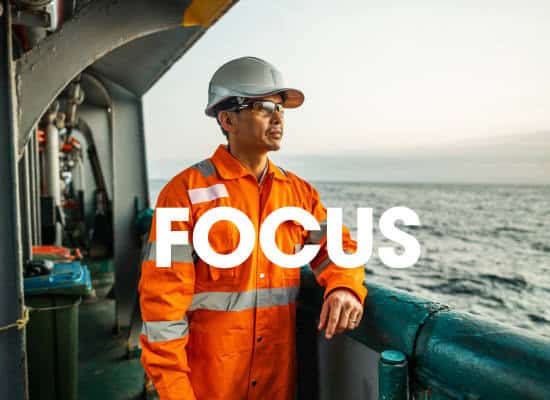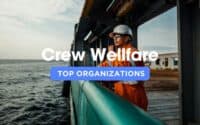Top 30 Techniques to Keep Your Ships’ Crew Alert and Focused

The challenges of long voyages, night shifts, and repetitive tasks can lead to fatigue and decreased vigilance, which are significant risk factors on the high seas. To combat these challenges, ship owners and operators can implement a variety of strategies designed to enhance the physical, mental, and environmental conditions aboard their vessels. Below we explore 30 effective methods to keep pilot and crew members sharp and focused, ensuring their well-being and the smooth operation of maritime activities.
* Please send feedback/suggestions to editor @ shipuniverse.com
- Implement Structured Shift Rotations: Establishing structured and predictable shift rotations can help crew members manage their sleep patterns more effectively. Adequate rest is critical for maintaining high levels of alertness and focus, especially during long voyages.
- Provide Nutritious Meal Options: Encourage alertness by offering meals that are rich in proteins, fruits, and vegetables, and low in heavy carbohydrates. Foods that cause a rapid increase and decrease in blood sugar can lead to fatigue. Providing healthy snacks throughout the shift can also help maintain energy levels.
- Create Engaging Training Sessions: Regularly schedule training sessions that involve active participation and critical thinking exercises. This not only keeps the crew’s skills sharp but also ensures their minds are engaged and focused, reducing the monotony of routine tasks.
- Designate Areas for Regular Physical Activity: Set up a designated space where crew members can engage in light exercise. Physical activity increases blood flow to the brain, which can help improve alertness and cognitive function.
- Foster a Culture of Open Communication: Encourage crew members to communicate openly about their fatigue levels and provide feedback on the scheduling. Open communication can help identify potential issues with alertness before they become safety concerns.
- Regular Safety Drills: Keep your crew sharp and prepared by conducting regular safety drills. These drills not only reinforce safety procedures but also break up the routine, keeping the crew’s minds active and engaged.
- Enhance Onboard Lighting: Proper lighting can significantly affect alertness. Install bright, white lights in work areas to simulate daylight, helping to maintain the crew’s circadian rhythms and reduce feelings of drowsiness.
- Limit Nighttime Exposure to Blue Light: Encourage crew members to limit their exposure to blue light from screens before bedtime. Consider providing blue light filters for screens on the navigation bridge and in common areas to help maintain natural sleep cycles.
- Offer Caffeine Wisely: Provide access to caffeine through coffee or tea, but advise moderation. Caffeine can be a great tool for enhancing alertness, especially during the early part of a shift or during nighttime operations, but too much can interfere with sleep and lead to increased fatigue later.
- Promote Mental Health Resources: Mental well-being is just as important as physical health in maintaining alertness. Provide resources and support for mental health, including access to counseling services, stress management programs, and relaxation techniques.
- Noise Management: Reduce background noise using soundproofing materials in areas where concentration is crucial, like the navigation bridge. Excessive noise can be a significant distraction and can lead to fatigue, so managing this can help maintain focus.
- Temperature Control: Maintain a comfortable temperature in workspaces. Extremes of heat or cold can detract from focus and alertness. Setting a moderate, stable temperature helps keep the crew comfortable and attentive.
- Scheduled Social Activities: Organize regular social events to boost morale and maintain mental health. Social interaction is a great way to relieve stress and prevent the feeling of isolation, especially on long voyages.
- Use of Stimulating Scents: Introduce mild and stimulating scents in common areas or workspaces, such as peppermint or citrus, which can help enhance concentration and mental alertness.
- Continuous Education and Skill Development: Offer ongoing educational programs and skill development opportunities. Learning new skills or enhancing existing ones can keep the crew’s minds engaged and focused, and also contribute to their professional growth.
- Ergonomic Adjustments: Ensure that the physical work environment, including the seating, control panels, and common spaces, are ergonomically designed. Proper ergonomics reduce physical strain and discomfort, which can significantly improve focus and alertness.
- Visual Cues and Reminders: Place visual cues around the ship that remind crew members to assess their alertness levels and take breaks when needed. Simple posters or electronic reminders can help in maintaining high levels of safety and vigilance.
- Nutritional Guidance: Provide guidance on nutrition that can help maintain energy levels throughout shifts. Include information on the best types of food that boost cognitive function and keep energy levels stable.
- Encourage Short Naps: For long voyages, incorporate scheduled napping into shift patterns, especially for crew members on night shifts or those working in high-intensity roles. Short power naps can significantly improve alertness and performance.
- Feedback Mechanisms: Implement systems for crew members to provide feedback on their alertness and the effectiveness of the strategies being used. This can include regular surveys or an open-door policy with ship management. Feedback helps in continuously improving the working conditions and strategies to maintain alertness.
- Interactive Safety Equipment Training: Regularly update and train crew on the use of safety equipment with hands-on sessions. Interactive training helps in retaining attention and ensuring that everyone knows how to act swiftly and correctly in case of emergencies.
- Cultural and Language Education: Provide lessons on cultural understanding and language training, especially for multinational crews. This enhances team cohesion, reduces misunderstandings, and keeps crew members engaged with each other.
- Rotation of Duties: Rotate duties among the crew when possible to avoid monotony and keep the work environment stimulating. Changing responsibilities can help maintain interest and alertness.
- Invest in Quality Lighting: Ensure that all areas, especially workstations, are well-lit with quality lighting solutions that mimic natural light. This can help reduce eye strain and fatigue, particularly during night shifts.
- Promote Healthy Sleep Hygiene: Educate crew on the importance of sleep hygiene. Encourage routines that promote restful sleep, such as limiting caffeine and screen time before bed, establishing regular sleep schedules, and creating a comfortable sleeping environment.
- Regular Medical Check-Ups: Ensure that all crew members undergo regular medical check-ups to monitor their health. Health issues can significantly impact alertness and focus, so catching and addressing any issues early is vital.
- Access to Psychological Support: Make psychological support available onboard or via telehealth services. Mental health is as crucial as physical health in maintaining focus and dealing with the stresses of maritime life.
- Create Relaxation Zones: Designate areas on the ship where crew members can relax and unwind. These zones should be away from the work areas and equipped with comfortable seating, soothing music, and perhaps books or magazines.
- Implement Progressive Relaxation Techniques: Train crew in relaxation techniques such as guided imagery, progressive muscle relaxation, or mindfulness meditation. These techniques can help manage stress and improve overall focus and cognitive function.
- Use of Technology Aids: Introduce technological aids like apps or wearables that monitor health metrics and provide reminders to take breaks or stay hydrated. Technology can be a powerful tool in maintaining high levels of alertness and safety on board.
Implementing these 30 strategies not only enhances the safety and productivity of maritime operations but also contributes to a healthier, more engaged, and resilient crew. By prioritizing the well-being of their teams through regular health check-ups, psychological support, proper nutrition, and environmental adjustments, ship owners can foster a proactive culture of safety and focus. Adopting these practices will not only mitigate risks but also improve the overall quality of life on board, making ships safer and more pleasant workplaces for everyone.

Do you have any feedback or additional insights? Please reach out to editor @ shipuniverse.com



